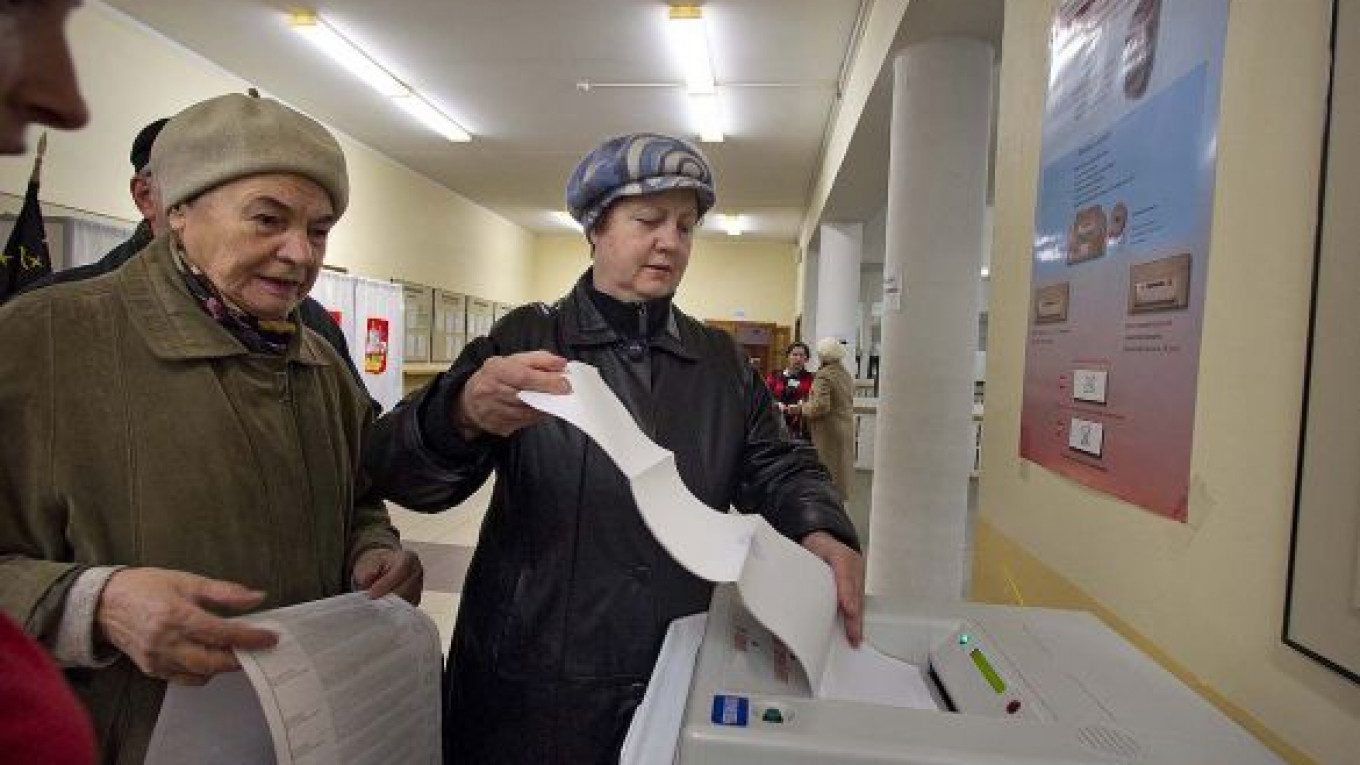The Central Elections Commission said Wednesday that regional authorities should be allowed to decide on an individual basis whether to use vote-counting machines, which elections observers say are more effective at blocking vote-rigging than regular ballot boxes.
Federal elections officials said that although they backed vote-counting machines in principle, the recent surge in the number of political parties complicates their use as the machines are unable to process ballots with so much information.
Central Elections Commission Secretary Nikolai Konkin said in comments carried by Interfax that the commission would publish its final ruling next week ahead of regional elections scheduled for September.
Lawmakers have for weeks been debating how to get around the problem of processing ballots containing the names of dozens of newly registered parties, since the current vote-counting machines, known as KOIBs, can only process ballots with up to 12 party names.
Since April, the number of registered parties has surged from seven to 59 after then-President Dmitry Medvedev slashed the membership requirement for party registration to 500 people.
Last week, Vladimir Pligin, head of the State Duma's Constitutional and State Affairs Committee, wrote a letter to Medvedev and Elections Commission Chief Vladimir Churov recommending that production of vote-counting machines be halted due to inflated party numbers.
He said the move would save the federal budget roughly 11 billion rubles ($365 million) and that ballots could measure close to two meters.
Elections observers said attempts to circumvent automated vote-counting devices were bound to facilitate electoral violations.
"Vote-counting machines are seen as fairer because they prevent falsifications at voting stations and inserting whole bundles of votes in favor of the ruling party," Alexander Kynev, head of the analytical department at independent elections watchdog Golos, said by phone.
But Kynev said that vote-counting machines could still be tampered with to make deliberate mistakes and stressed the importance of independent observers in guaranteeing fair vote totals.
"If there aren't observers alongside vote-counting machines, the authorities can devise whatever result they want," he said.
In an effort to make voting go more smoothly with the larger number of parties, the Liberal Democratic Party has recommended only permitting certain parties to compete in elections, while the ruling United Russia party has backed allotting two voting days instead of one. The Communists have advised exclusively using traditional paper ballots.
Among the more colorful proposals was one from United Russia lawmaker Alexander Sidyakin, who suggested political parties choose an animal to be associated with to make them stand out.
In a blog post, Sidyakin assigned United Russia a white bear, the Communist Party a moose, the Liberal Democratic Party a falcon and A Just Russia a cock. For the non-Duma parties, Sidyakin's choice of animals seemed to be politically tinged: a rat for the Republican Party — Party of People's Freedom, a skunk for the liberal Yabloko party and a peacock for billionaire businessman Mikhail Prokhorov's Civil Platform.
Sidyakin's idea was shot down by United Russia's opponents, who described it as "delirious" and "childish."
Contact the author at [email protected]
Related articles:
A Message from The Moscow Times:
Dear readers,
We are facing unprecedented challenges. Russia's Prosecutor General's Office has designated The Moscow Times as an "undesirable" organization, criminalizing our work and putting our staff at risk of prosecution. This follows our earlier unjust labeling as a "foreign agent."
These actions are direct attempts to silence independent journalism in Russia. The authorities claim our work "discredits the decisions of the Russian leadership." We see things differently: we strive to provide accurate, unbiased reporting on Russia.
We, the journalists of The Moscow Times, refuse to be silenced. But to continue our work, we need your help.
Your support, no matter how small, makes a world of difference. If you can, please support us monthly starting from just $2. It's quick to set up, and every contribution makes a significant impact.
By supporting The Moscow Times, you're defending open, independent journalism in the face of repression. Thank you for standing with us.
Remind me later.






